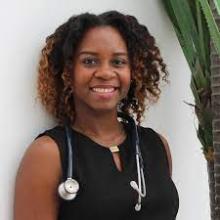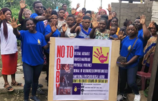The Black Church: Our Refuge, Our Mental Health
The Black Church: Our Refuge, Our Mental Health

In Conversation with ADAA’s 2023 Conference Timely Topic Presenters: Bernadine Waller, PhD, Atasha Jordan, MBA, MD and Kimberly Arnold, MPH, PhD
The African American scholar, filmmaker and author Henry Louis Gates, Jr., in his book, The Black Church: This Is Our Story, This Is Our Song, defines the Black church as more than just a place of worship. He calls it a “key refuge for many in hard times.” He writes that the Black church is “a place of racial and individual self‑affirmation, of teaching and learning, of psychological and spiritual sustenance.” The Harvard University professor refers to the Black church as “a symbolic space where Black people, enslaved and free, could nurture the hope for a better today and a much better tomorrow.”
Working with Black churches to create a better today and a much better tomorrow in the field (literally) of mental health care for African Americans are three Black leaders in mental health who will present at the 2023 ADAA Conference. ADAA is excited to have Bernadine Waller, PhD, Atasha Jordan, MBA, MD and Kimberly Arnold, MPH, PhD discuss their work, research and findings in a presentation titled Implementing Evidence-Based Mental Health Interventions in Black Churches.
Over 80 percent of Black people in America identify as Christian with many in that percentage attending Black churches. Drs. Waller, Jordan and Arnold realize that stigma around mental health continues to exist in some Black communities and that many Black Americans are still distrustful of mental health providers or have a difficult time accessing mental health care in traditional settings.
Contending with centuries of racially-based inequities, marginalization and discrimination in mental healthcare, Black Americans have often turned to their places of worship for support. These three leaders, all of whom are connected to the Black church in some way, are employing community-engaged approaches to bring mental health care to them, at their church or within their faith-based communities.
Built by Black People for Black People
The Black church was the first institution built and run by Black people in the United States. It is not just a place of religion, but a vital part of their political, cultural, educational and social lives. It has also taken an important role in the physical and mental wellbeing of its members.
Dr. Waller, a clinical researcher at Columbia University’s Irving Medical Center and the New York State Psychiatric Institute, as well as a deaconess at her own church, says the church for many Black communities is “a place where mutual aid is found and accessed.”
“Black people could not rely on formal systems of support a lot of the time, so they created their own. And a lot of the bigger churches are well structured when it comes to resources,” Dr. Waller told ADAA. “They have counselors, tutors, doctors, lawyers, educators and childcare professionals within their congregations.”
Dr. Waller stresses the importance of using existing resources and the expertise within the Black churches when addressing mental health care access and treatment. Her work involves partnering with church leaders and members to create sustainable educational and practical mental health resources for the community. She says that may be in the form of trainings, particularly train-the-trainer models, and developing a workforce of community mental health workers to deliver various interventions and offer referrals to specialized mental health providers.
“Our work is about meeting people where they are when it comes to psychiatric and mental health care,” she added.
Meeting Them Humbly at the Intersection of Science and Faith
Each church has its own culture and needs, says Dr. Atasha Jordan, a fourth-year psychiatry resident at the University of Pennsylvania Hospital. Born in Barbados, Dr. Jordan grew up in a strong Christian Caribbean environment and continues to find ways to merge her faith with her medical profession.
“We come into the churches with humility. We have some tools going in but we don’t assume anything,” Dr. Jordan explained, “Instead, we ask what they need and how we can work together to use the tools, or even create new ones for them because not the same approach is going to work for every community.”
Dr. Kimberly Arnold agrees. She is working with Dr. Jordan on implementing and evaluating Mental Health First Aid in Black churches in Philadelphia. She also leads a separate mental health project focused on engaging Black churches in the Greater Philadelphia area in the creation of tiered supports for mental health along the continuum of prevention and treatment. Dr. Arnold is an Assistant Professor in Family Medicine and Community Health with a secondary appointment in the Department of Psychiatry at the Perelman School of Medicine at the University of Pennsylvania. Her research focuses on reducing physical and mental health disparities that disproportionately affect Black Americans and engaging community members in the implementation of evidence-based mental health interventions.
“We have to recognize that churches are already a community; so before we come in as professionals, we have to understand who they are, what they want and what our role is in helping them to meet their needs,” Dr. Arnold told ADAA, highlighting the need for respectfulness, inclusiveness, and relationship-building.
Dr. Arnold uses a strengths-based approach to enhance or create mental health supports in churches such as peer groups, workshops, and evidence-based interventions that can be led by lay church members who partner with mental health providers for additional support within or outside of the church when needed. She ensures that her work with the churches, their members and leaders, leaves a lasting effect.
“The work has to be sustainable,” Dr. Arnold continued, “with resources and concrete actions that the church can imbed in its own culture and practices after we’re gone.”
Partners in Mental Health and Christian Beliefs
One thing the three researchers have found in the preliminary data from their individual projects is that trust is essential, and familiarity helps. Having a strong Christian background and similar values and beliefs has been beneficial.
“People of faith and the Black Christians that I work with have a greater comfort level with Christian providers or people who have a connection to their faith,” said Dr. Jordan.
As Black Christians and mental health providers, Drs. Jordan, Arnold and Waller take their faith and practice into the churches with them and use both for good. However, not without some struggles of their own.
“Often times as professionals, we aren’t necessarily trained to show or say that we don’t know something,” Dr. Waller explained, “But working with entities like the Black church, they want to know not only that you are a part of them, not only that you care, but that you are willing to explore the answers with them.”
Dr. Waller told ADAA that their conference presentation will highlight how the three researchers, in their work with Black churches, examined structural inequities that have predisposed a lot of Black people to mental health issues. While Black people may not have the highest prevalence of anxiety and depression, she said, they are more likely to have a protracted course because of the lack of access to culturally salient care.
Providing mental health education, resources and care in nontraditional settings, these three mental health professionals are not just exploring answers; they are making a difference.























